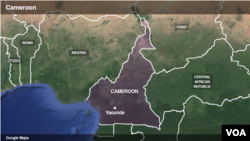Cameroon's military says it has arrested four of its troops for the killing of nine civilians, including four women and a baby. A military spokesman says the troops fired on villagers after not getting any help in their search for a missing colleague in the rebel-prone area.
Cameroon’s military says the troops were deployed in the northwest village of Missong on June 1 to search for their missing colleague.
A military statement Tuesday night said villagers were “deviant in their behavior” toward the troops, who then fired on the unarmed civilians.
The rare statement of military wrongdoing said the troops killed four women, four men, and an 18-month-old girl, while a 12-year-old was injured.
Relatives of the victims, who did not want to be identified for fear of retaliation, told VOA the troops got angry when the villagers refused to help them find their missing colleague.
They said the troops were demanding villagers show them rebel hideouts, which they were afraid to do for fear of rebel payback.
Tamfu Richard is a human rights lawyer and member of the Cameroon Bar Council.
He notes it is not the first time the military has arrested troops for atrocities and that victims are still waiting for justice.
"We don't have the feeling that the government itself is ready and willing to punish its elements," said Tamfu. "We have witnessed that with the Ngarr-buh case which up till now is still pending before the courts. The government should hold these offices accountable and make sure that they face the law and that severe sanctions should be meted out on them. It is not permitted during war periods that human rights be violated or that you should kill innocent civilians."
Cameroon’s military stormed Ngarr-buh, a northwestern village, in February 2020, killing 21 civilians.
Authorities initially denied their troops committed the massacre, calling the accusation separatist propaganda. But after international pressure, Cameroon authorities admitted troops were responsible.
Joseph Vincent Ntouda Ebode is a conflict resolution specialist at the University of Yaoundé.
He says it is surprising that Cameroon’s military, which prides itself on high quality training and respect for human rights, opened fire on unarmed civilians. Edobe says the abuse has scared many civilians from helping government troops by sharing information on separatist activities. He says if the military does not bring arrested troops to justice immediately, civilians may even begin sympathizing with separatists, who claim they are protecting English-speaking Cameroonians from military brutality.
Rights groups have accused both Cameroon's military and anglophone separatists of killing civilians and torching their homes during the five-year conflict.
Both sides reject the accusations as intended to tarnish their image.
Unrest in Cameroon’s English-speaking western regions began in 2016 after teachers and lawyers protested the dominance of French-speakers in the officially bilingual country.
The military responded with a crackdown and rebels took up arms, saying they had to defend the minority English-speakers.
The U.N. says clashes between the two sides have left at least 3,300 people dead and more than 750,000 internally displaced.




